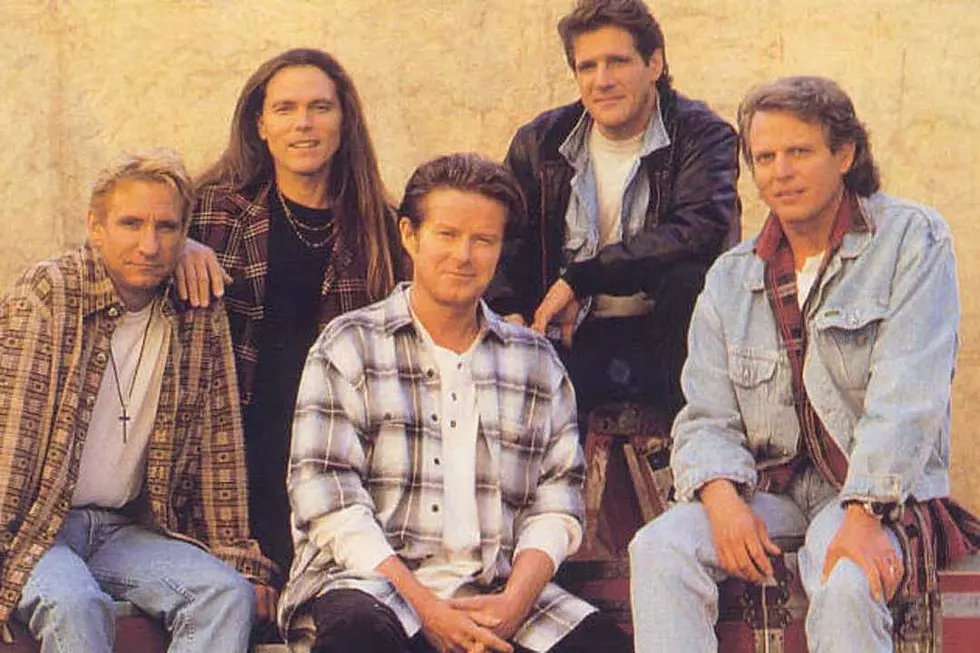In 1994, fourteen years after their acrimonious breakup, the Eagles came together for a new album and worldwide tour. The dissension that led to the group’s disintegration had been so rancorous that, when earlier asked about a reunion tour, drummer Don Henley said it would happen “when Hell freezes over.” So naturally, the Eagles titled their new album, “Hell Freezes Over.” Mostly, the album was a compilation of live, acoustic versions of Eagles hits: “Hotel California,” “Take It Easy,” “Tequila Sunrise”. But there were a few new songs, including one by Glen Frey entitled, “The Girl from Yesterday.”

In the song, a man leaves a woman. He not only abandons the relationship, but also the town, state, and country where they live. He boards a plane without so much as a backward glance, and the woman is left with her yearning. The last line of the first stanza reveals, “And she became the girl from yesterday.”
Fast forward years, and the woman still waits on the man. She keeps vigil, never wavering, faithful and true, in hopes that he’ll come home. The song’s bridge says:
She doesn’t know what’s right, she doesn’t know what’s wrong
She only knows the pain that comes from waiting so long
And she doesn’t count the teardrops that she’s cried while he’s away
Because she knows deep in her heart that he’ll be back someday…
I got to thinking about that Eagles song, now twenty-seven years old itself, because, though we’re all still sluffing off the effects of Thanksgiving tryptophan, today is the First Sunday of Advent. Our posture, our horizon, our mindset changes on this day. Today we enter into the Church’s great season of waiting.
What are we waiting for? Well, the children among us—and the child within us—will say that we are waiting for Christmas, the Nativity, the birth—again—of the Christ child. That’s not wrong. We’ll pile into the Cathedral on Christmas Eve in celebration of exactly that coming. But there may be danger if that’s only, or even primarily, what Advent waiting is all about. Because Christmas, when it comes, is so often backward-looking. It can be all about custom and an annual return to a gauzy past, where (in our faulty memory, at least) we felt comfortable, and content, and secure.
In our present world, in which so much is in flux and nothing seems sure, that backward-looking waiting for the return of what was can occupy our whole attention, but it can also bring its own sort of pain. We can cling to that past so tightly that we become calcified, trapped so that we cannot move. Like the woman in the Eagles song, we become a modern-day Miss Havisham, living lives in which time has stopped and everything is arrested, hoping against hope that the world will go back to what it was in the ideal of our memory. The last stanza of “The Girl from Yesterday” says:
The light’s on in the window, she’s waiting by the phone
Talking to a memory that’s never coming home
She dreams of his returning and the things that he might say
But she’ll always be the girl from yesterday
Yeah, she’ll always be the girl from yesterday.

In our backward pining for the return of what was, we may become stunted in our willingness and ability to look forward to what can be. And that gets us to the other way of conceiving of Advent. We don’t talk much about it in Christianity anymore, and we especially don’t talk about it in the Episcopal Church, but Advent is the season in which we are called to wait upon not only the coming of Christmas again and again and again, but also to wait upon the Second Coming of Christ.
We ignore this doctrine of the Church in some embarrassment, I think, for two reasons. First, because it gets confused with the odious, modern notion of the Rapture, that ridiculous and fabricated theological idea tied to John Nelson Darby. Second, because we’ve lost our sense of the mythical, and we take too literally the images of Jesus returning on a cloud, or with a double-edged sword in his mouth like some sort of cosmic circus performer. Nevertheless, it is one of the tragedies of contemporary Christianity that we ignore doctrines that have granted hope for millennia because we fail to understand them.
The doctrine of the Second Coming of Christ is simply this: When Jesus first lived among us, he embodied in his person the intentions of God: The ways we are to be faithful, and courageous, and love. If ever we want to know what God is like, and how God calls us to be, we need only look at the person of Jesus. When Jesus comes a second time, those intentions of God—that fidelity, courage, and love—will wash over the whole creation. What was circumscribed in a single man, in the backwater of the world, will instead abide in all of us and all of our relationships. The whole world will be consumed, healed, and fulfilled, by grace. The brokenness, the shattering not-rightness-of-it-all will be mended into a wholeness we can scarcely imagine.
Why wouldn’t we retain such a doctrine? Why wouldn’t we preach it first and foremost? Why wouldn’t it be what we are waiting for?
Because it won’t be easy. The advent of something new never is. Healing never is. Whether physical, emotional, psychological, or spiritual, moving from what was into what can be—moving from yesterday to tomorrow—is often a painful process. But it is exactly the opposite pain from the that experienced by “The Girl from Yesterday.” Her pain was the pining, ultimately hopeless kind, the pain that comes from the wishful thinking that the past—which was never as ideal as our memory claims anyway—will return unaltered. The pain of waiting on the return of Christ is, rather, like growing pains, the pain that knows the past must be allowed to die so that the future can be born. Among other things, it begs the question, “What must change in me before I can be ready for Christ’s return?” This is why the Advent readings talk of destruction and dismantling, so that we recognize that the old world of our pining, prejudice, and preconception must be let go in order to be ready, open-eyed and open-hearted, for the coming of Christ. This is why the Book of Revelation includes twenty long chapters describing what must pass away before God says, “See, I’m making all things new.”[i]
I hope the character of our waiting in this season won’t be a vigil for the return of the false ideal of a lost past, either personal or corporate. Let’s instead wait in hope for the new thing God will do, in us, among us, and throughout our suffering world, when God will fulfill God’s promise to heal all brokenness, dispel all loneliness, and dry all tears. I’m already looking forward to Christmas. There’s nothing wrong with that. But even more, I’m looking forward to Jesus’ return, to the grace that will wash over the whole world in God’s good time, mending and making whole, ushering in goodness and grace. Advent has begun. And so, we wait. With faith that moves mountains and hope eternal, we wait.
[i] Revelation 21:5



